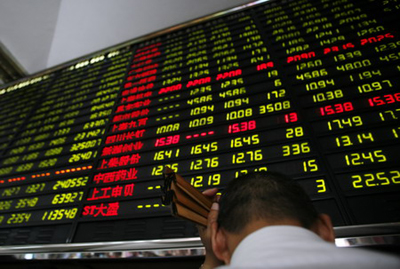Tuesday, 18 August 2015 16:04
 SHANGHAI: Shanghai stocks closed down more than six percent Tuesday, their biggest fall in three weeks, due to worries over the slowing Chinese economy and the government’s commitment to prop up shares, dealers said.
SHANGHAI: Shanghai stocks closed down more than six percent Tuesday, their biggest fall in three weeks, due to worries over the slowing Chinese economy and the government’s commitment to prop up shares, dealers said.
The benchmark Shanghai Composite Index slumped 6.15 percent, or 245.51 points, to 3,748.16 on turnover of 722.5 billion yuan ($ 112.9 billion).
It was the biggest one-day drop since July 27, when it plunged 8.48 percent — its sharpest fall in eight years.
The Shenzhen Composite Index, which tracks stocks on China’s second exchange, ended down 6.58 percent, or 153.07 points, to 2,174.42 on turnover of 667.3 billion yuan.
“The market lacks the momentum to go up. There is no major positive news” on the economy, Shen Zhengyang, an analyst at Northeast Securities, told AFP.
“In the short-term, the market will fluctuate on the weak side,” he said.
The Shanghai index briefly broke above 4,000 points on Tuesday, but failed to hold above the symbolic mark.
A slowing economy and a surprise currency devaluation last week have weighed on sentiment, despite a pledge by the market regulator on Friday that it will stabilise stock prices for a number of years.
China devalued its currency last week, a move widely seen as an attempt to boost stalling exports that added to worries about the health of the world’s second-largest economy.
Facing tight liquidity, the central bank on Tuesday said it pumped 120 billion yuan into China’s money market, which state media said was the largest single-day cash injection since January 2014.
“The (stock) market is facing lots of pressure near 4,000 points and the upward momentum was not strong enough to push it through. So some investors took profits because they are afraid,” Zheshang Securities analyst Zhang Yanbing told AFP.
The China Securities Regulatory Commission (CSRC) said Friday the state-backed China Securities Finance Corp. (CSF), which is tasked with buying shares on behalf of the government, will have a long-term role.
But some investors were still sceptical that would be enough to support equities.
“Investors ran for the exit when the government failed to step in to support the market,” Steve Wang, chief China economist at Reorient Financial Markets Ltd. in Hong Kong, told Bloomberg News.
“The CSF has become a main player in this market so everyone is watching it. People panic when it stops buying.”
Following a market crash in mid-June, the government moved to prop up shares, including by barring “big” investors from selling their stakes and cracking down on short-selling — when investors bet prices will go lower.
Railway-related firms were among the biggest losers in Shanghai. China Railway Erju plunged by its 10 percent daily limit to 14.90 yuan, while China Railway Construction slid 9.87 percent to 16.16 yuan.
Tianjin-linked firms fell after explosions last week in the port city, which killed at least 114 people.
Shanghai-listed Tianjin Port slumped by its 10 percent daily limit to 12.73 yuan and Shenzhen-listed Tianjin Binhai Energy and Development also lost 10 percent to 18.20 yuan.




























